A Study on the Growth and Evolution of Delegated Legislation
VerifiedAdded on 2024/06/21
|19
|6185
|283
Report
AI Summary
This report provides an in-depth analysis of the growth of delegated legislation in India, exploring its pre- and post-independence evolution, the technical issues driving its expansion, and the pressures on parliamentary time. It examines the complexity of the modern state, the need for flexibility in law-making, and the role of emergency situations in fostering delegated legislation. The report includes a literature review highlighting the importance of the rule of law and judicial review, and references key cases and statutes relevant to the topic. The objectives of the study include understanding the role of delegated legislation in India, examining its function in law-making, and identifying the reasons for its growth. The report concludes by emphasizing the significance of delegated legislation within the Indian legal framework.

GROWTH OF DELEGATED LEGISLATION
Paraphrase This Document
Need a fresh take? Get an instant paraphrase of this document with our AI Paraphraser
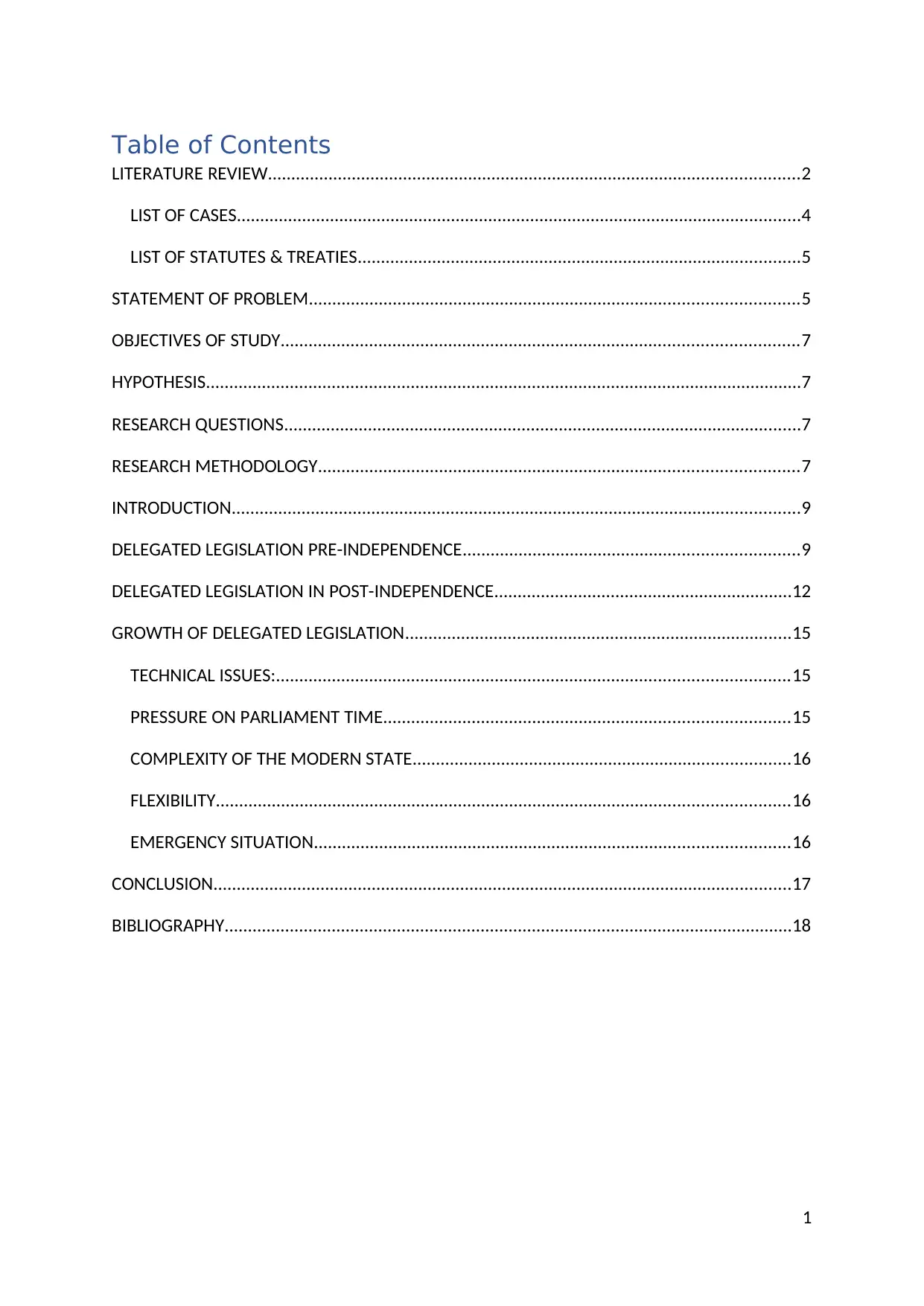
Table of Contents
LITERATURE REVIEW..................................................................................................................2
LIST OF CASES.........................................................................................................................4
LIST OF STATUTES & TREATIES...............................................................................................5
STATEMENT OF PROBLEM.........................................................................................................5
OBJECTIVES OF STUDY...............................................................................................................7
HYPOTHESIS................................................................................................................................7
RESEARCH QUESTIONS...............................................................................................................7
RESEARCH METHODOLOGY.......................................................................................................7
INTRODUCTION..........................................................................................................................9
DELEGATED LEGISLATION PRE-INDEPENDENCE........................................................................9
DELEGATED LEGISLATION IN POST-INDEPENDENCE................................................................12
GROWTH OF DELEGATED LEGISLATION...................................................................................15
TECHNICAL ISSUES:..............................................................................................................15
PRESSURE ON PARLIAMENT TIME.......................................................................................15
COMPLEXITY OF THE MODERN STATE.................................................................................16
FLEXIBILITY...........................................................................................................................16
EMERGENCY SITUATION......................................................................................................16
CONCLUSION............................................................................................................................17
BIBLIOGRAPHY..........................................................................................................................18
1
LITERATURE REVIEW..................................................................................................................2
LIST OF CASES.........................................................................................................................4
LIST OF STATUTES & TREATIES...............................................................................................5
STATEMENT OF PROBLEM.........................................................................................................5
OBJECTIVES OF STUDY...............................................................................................................7
HYPOTHESIS................................................................................................................................7
RESEARCH QUESTIONS...............................................................................................................7
RESEARCH METHODOLOGY.......................................................................................................7
INTRODUCTION..........................................................................................................................9
DELEGATED LEGISLATION PRE-INDEPENDENCE........................................................................9
DELEGATED LEGISLATION IN POST-INDEPENDENCE................................................................12
GROWTH OF DELEGATED LEGISLATION...................................................................................15
TECHNICAL ISSUES:..............................................................................................................15
PRESSURE ON PARLIAMENT TIME.......................................................................................15
COMPLEXITY OF THE MODERN STATE.................................................................................16
FLEXIBILITY...........................................................................................................................16
EMERGENCY SITUATION......................................................................................................16
CONCLUSION............................................................................................................................17
BIBLIOGRAPHY..........................................................................................................................18
1
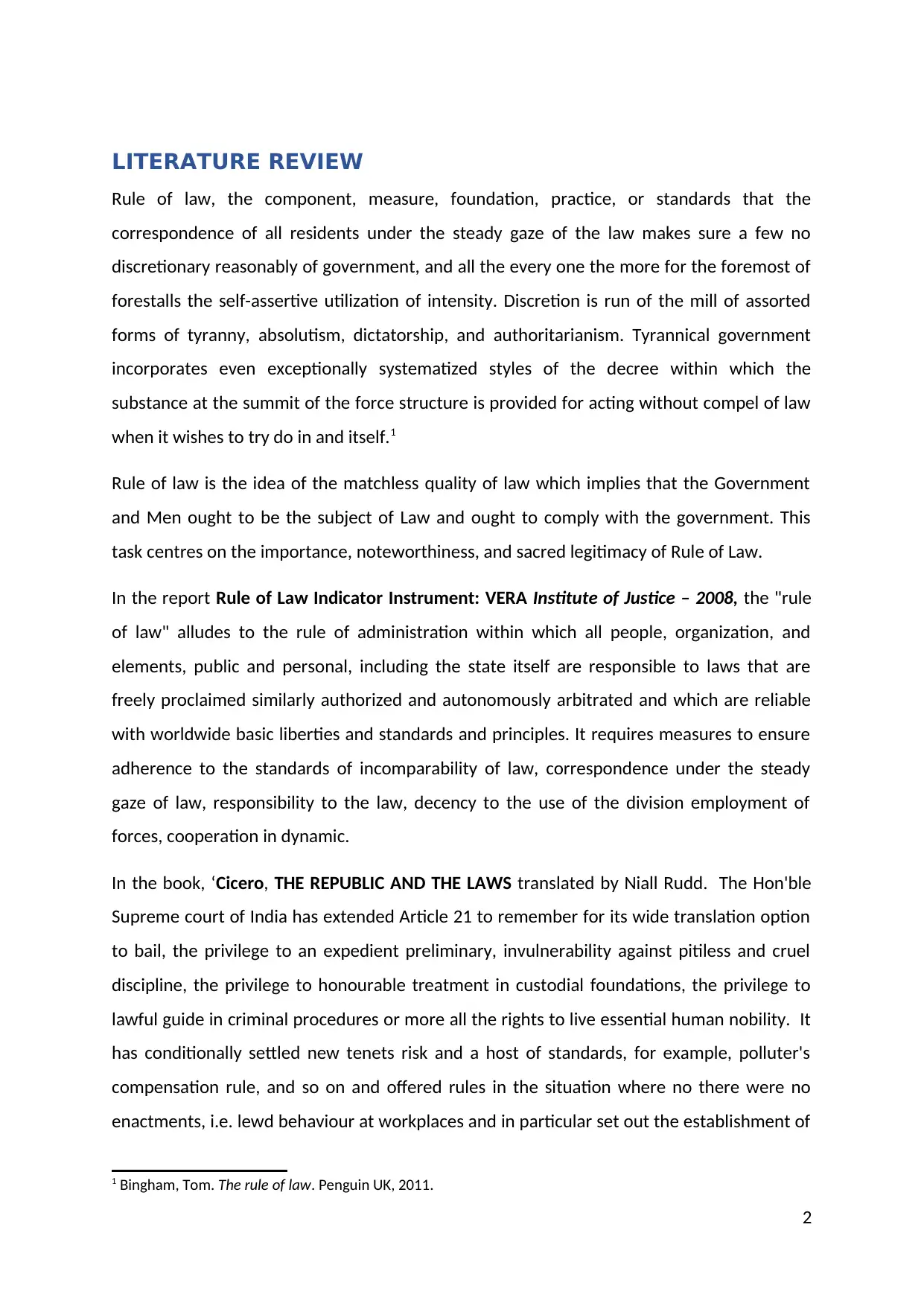
LITERATURE REVIEW
Rule of law, the component, measure, foundation, practice, or standards that the
correspondence of all residents under the steady gaze of the law makes sure a few no
discretionary reasonably of government, and all the every one the more for the foremost of
forestalls the self-assertive utilization of intensity. Discretion is run of the mill of assorted
forms of tyranny, absolutism, dictatorship, and authoritarianism. Tyrannical government
incorporates even exceptionally systematized styles of the decree within which the
substance at the summit of the force structure is provided for acting without compel of law
when it wishes to try do in and itself.1
Rule of law is the idea of the matchless quality of law which implies that the Government
and Men ought to be the subject of Law and ought to comply with the government. This
task centres on the importance, noteworthiness, and sacred legitimacy of Rule of Law.
In the report Rule of Law Indicator Instrument: VERA Institute of Justice – 2008, the "rule
of law" alludes to the rule of administration within which all people, organization, and
elements, public and personal, including the state itself are responsible to laws that are
freely proclaimed similarly authorized and autonomously arbitrated and which are reliable
with worldwide basic liberties and standards and principles. It requires measures to ensure
adherence to the standards of incomparability of law, correspondence under the steady
gaze of law, responsibility to the law, decency to the use of the division employment of
forces, cooperation in dynamic.
In the book, ‘Cicero, THE REPUBLIC AND THE LAWS translated by Niall Rudd. The Hon'ble
Supreme court of India has extended Article 21 to remember for its wide translation option
to bail, the privilege to an expedient preliminary, invulnerability against pitiless and cruel
discipline, the privilege to honourable treatment in custodial foundations, the privilege to
lawful guide in criminal procedures or more all the rights to live essential human nobility. It
has conditionally settled new tenets risk and a host of standards, for example, polluter's
compensation rule, and so on and offered rules in the situation where no there were no
enactments, i.e. lewd behaviour at workplaces and in particular set out the establishment of
1 Bingham, Tom. The rule of law. Penguin UK, 2011.
2
Rule of law, the component, measure, foundation, practice, or standards that the
correspondence of all residents under the steady gaze of the law makes sure a few no
discretionary reasonably of government, and all the every one the more for the foremost of
forestalls the self-assertive utilization of intensity. Discretion is run of the mill of assorted
forms of tyranny, absolutism, dictatorship, and authoritarianism. Tyrannical government
incorporates even exceptionally systematized styles of the decree within which the
substance at the summit of the force structure is provided for acting without compel of law
when it wishes to try do in and itself.1
Rule of law is the idea of the matchless quality of law which implies that the Government
and Men ought to be the subject of Law and ought to comply with the government. This
task centres on the importance, noteworthiness, and sacred legitimacy of Rule of Law.
In the report Rule of Law Indicator Instrument: VERA Institute of Justice – 2008, the "rule
of law" alludes to the rule of administration within which all people, organization, and
elements, public and personal, including the state itself are responsible to laws that are
freely proclaimed similarly authorized and autonomously arbitrated and which are reliable
with worldwide basic liberties and standards and principles. It requires measures to ensure
adherence to the standards of incomparability of law, correspondence under the steady
gaze of law, responsibility to the law, decency to the use of the division employment of
forces, cooperation in dynamic.
In the book, ‘Cicero, THE REPUBLIC AND THE LAWS translated by Niall Rudd. The Hon'ble
Supreme court of India has extended Article 21 to remember for its wide translation option
to bail, the privilege to an expedient preliminary, invulnerability against pitiless and cruel
discipline, the privilege to honourable treatment in custodial foundations, the privilege to
lawful guide in criminal procedures or more all the rights to live essential human nobility. It
has conditionally settled new tenets risk and a host of standards, for example, polluter's
compensation rule, and so on and offered rules in the situation where no there were no
enactments, i.e. lewd behaviour at workplaces and in particular set out the establishment of
1 Bingham, Tom. The rule of law. Penguin UK, 2011.
2
⊘ This is a preview!⊘
Do you want full access?
Subscribe today to unlock all pages.

Trusted by 1+ million students worldwide
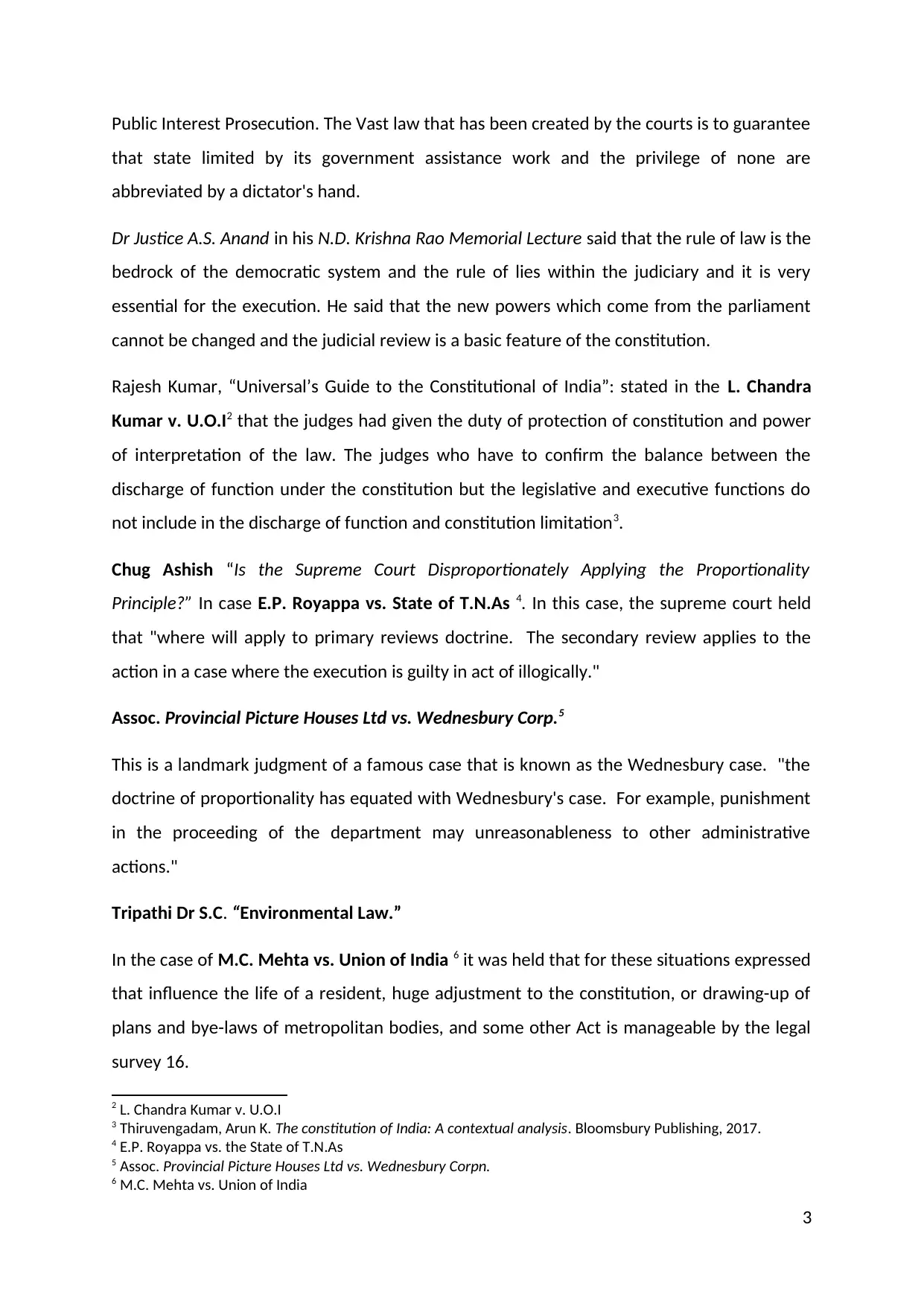
Public Interest Prosecution. The Vast law that has been created by the courts is to guarantee
that state limited by its government assistance work and the privilege of none are
abbreviated by a dictator's hand.
Dr Justice A.S. Anand in his N.D. Krishna Rao Memorial Lecture said that the rule of law is the
bedrock of the democratic system and the rule of lies within the judiciary and it is very
essential for the execution. He said that the new powers which come from the parliament
cannot be changed and the judicial review is a basic feature of the constitution.
Rajesh Kumar, “Universal’s Guide to the Constitutional of India”: stated in the L. Chandra
Kumar v. U.O.I2 that the judges had given the duty of protection of constitution and power
of interpretation of the law. The judges who have to confirm the balance between the
discharge of function under the constitution but the legislative and executive functions do
not include in the discharge of function and constitution limitation3.
Chug Ashish “Is the Supreme Court Disproportionately Applying the Proportionality
Principle?” In case E.P. Royappa vs. State of T.N.As 4. In this case, the supreme court held
that "where will apply to primary reviews doctrine. The secondary review applies to the
action in a case where the execution is guilty in act of illogically."
Assoc. Provincial Picture Houses Ltd vs. Wednesbury Corp.5
This is a landmark judgment of a famous case that is known as the Wednesbury case. "the
doctrine of proportionality has equated with Wednesbury's case. For example, punishment
in the proceeding of the department may unreasonableness to other administrative
actions."
Tripathi Dr S.C. “Environmental Law.”
In the case of M.C. Mehta vs. Union of India 6 it was held that for these situations expressed
that influence the life of a resident, huge adjustment to the constitution, or drawing-up of
plans and bye-laws of metropolitan bodies, and some other Act is manageable by the legal
survey 16.
2 L. Chandra Kumar v. U.O.I
3 Thiruvengadam, Arun K. The constitution of India: A contextual analysis. Bloomsbury Publishing, 2017.
4 E.P. Royappa vs. the State of T.N.As
5 Assoc. Provincial Picture Houses Ltd vs. Wednesbury Corpn.
6 M.C. Mehta vs. Union of India
3
that state limited by its government assistance work and the privilege of none are
abbreviated by a dictator's hand.
Dr Justice A.S. Anand in his N.D. Krishna Rao Memorial Lecture said that the rule of law is the
bedrock of the democratic system and the rule of lies within the judiciary and it is very
essential for the execution. He said that the new powers which come from the parliament
cannot be changed and the judicial review is a basic feature of the constitution.
Rajesh Kumar, “Universal’s Guide to the Constitutional of India”: stated in the L. Chandra
Kumar v. U.O.I2 that the judges had given the duty of protection of constitution and power
of interpretation of the law. The judges who have to confirm the balance between the
discharge of function under the constitution but the legislative and executive functions do
not include in the discharge of function and constitution limitation3.
Chug Ashish “Is the Supreme Court Disproportionately Applying the Proportionality
Principle?” In case E.P. Royappa vs. State of T.N.As 4. In this case, the supreme court held
that "where will apply to primary reviews doctrine. The secondary review applies to the
action in a case where the execution is guilty in act of illogically."
Assoc. Provincial Picture Houses Ltd vs. Wednesbury Corp.5
This is a landmark judgment of a famous case that is known as the Wednesbury case. "the
doctrine of proportionality has equated with Wednesbury's case. For example, punishment
in the proceeding of the department may unreasonableness to other administrative
actions."
Tripathi Dr S.C. “Environmental Law.”
In the case of M.C. Mehta vs. Union of India 6 it was held that for these situations expressed
that influence the life of a resident, huge adjustment to the constitution, or drawing-up of
plans and bye-laws of metropolitan bodies, and some other Act is manageable by the legal
survey 16.
2 L. Chandra Kumar v. U.O.I
3 Thiruvengadam, Arun K. The constitution of India: A contextual analysis. Bloomsbury Publishing, 2017.
4 E.P. Royappa vs. the State of T.N.As
5 Assoc. Provincial Picture Houses Ltd vs. Wednesbury Corpn.
6 M.C. Mehta vs. Union of India
3
Paraphrase This Document
Need a fresh take? Get an instant paraphrase of this document with our AI Paraphraser
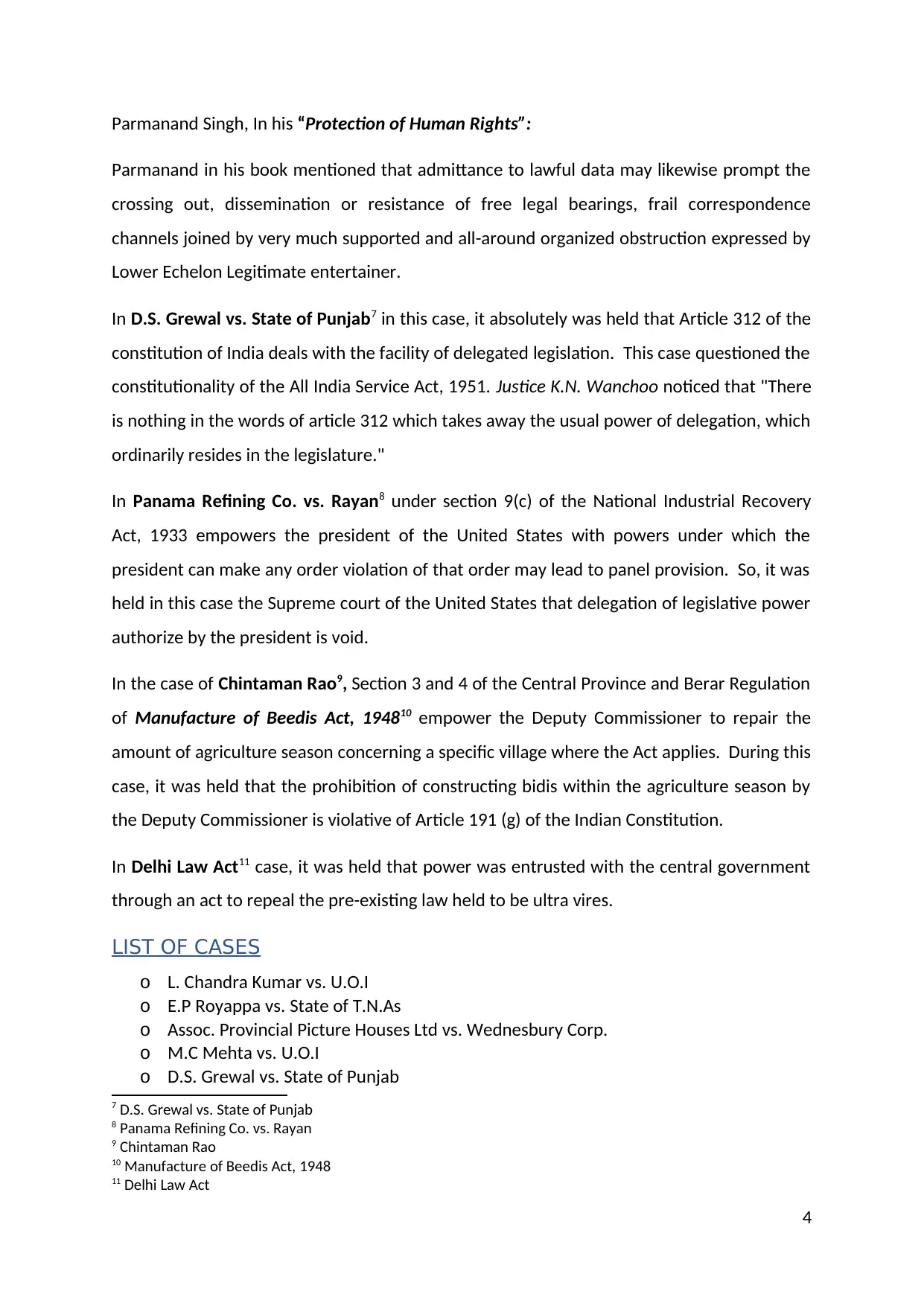
Parmanand Singh, In his “Protection of Human Rights”:
Parmanand in his book mentioned that admittance to lawful data may likewise prompt the
crossing out, dissemination or resistance of free legal bearings, frail correspondence
channels joined by very much supported and all-around organized obstruction expressed by
Lower Echelon Legitimate entertainer.
In D.S. Grewal vs. State of Punjab7 in this case, it absolutely was held that Article 312 of the
constitution of India deals with the facility of delegated legislation. This case questioned the
constitutionality of the All India Service Act, 1951. Justice K.N. Wanchoo noticed that "There
is nothing in the words of article 312 which takes away the usual power of delegation, which
ordinarily resides in the legislature."
In Panama Refining Co. vs. Rayan8 under section 9(c) of the National Industrial Recovery
Act, 1933 empowers the president of the United States with powers under which the
president can make any order violation of that order may lead to panel provision. So, it was
held in this case the Supreme court of the United States that delegation of legislative power
authorize by the president is void.
In the case of Chintaman Rao9, Section 3 and 4 of the Central Province and Berar Regulation
of Manufacture of Beedis Act, 194810 empower the Deputy Commissioner to repair the
amount of agriculture season concerning a specific village where the Act applies. During this
case, it was held that the prohibition of constructing bidis within the agriculture season by
the Deputy Commissioner is violative of Article 191 (g) of the Indian Constitution.
In Delhi Law Act11 case, it was held that power was entrusted with the central government
through an act to repeal the pre-existing law held to be ultra vires.
LIST OF CASES
o L. Chandra Kumar vs. U.O.I
o E.P Royappa vs. State of T.N.As
o Assoc. Provincial Picture Houses Ltd vs. Wednesbury Corp.
o M.C Mehta vs. U.O.I
o D.S. Grewal vs. State of Punjab
7 D.S. Grewal vs. State of Punjab
8 Panama Refining Co. vs. Rayan
9 Chintaman Rao
10 Manufacture of Beedis Act, 1948
11 Delhi Law Act
4
Parmanand in his book mentioned that admittance to lawful data may likewise prompt the
crossing out, dissemination or resistance of free legal bearings, frail correspondence
channels joined by very much supported and all-around organized obstruction expressed by
Lower Echelon Legitimate entertainer.
In D.S. Grewal vs. State of Punjab7 in this case, it absolutely was held that Article 312 of the
constitution of India deals with the facility of delegated legislation. This case questioned the
constitutionality of the All India Service Act, 1951. Justice K.N. Wanchoo noticed that "There
is nothing in the words of article 312 which takes away the usual power of delegation, which
ordinarily resides in the legislature."
In Panama Refining Co. vs. Rayan8 under section 9(c) of the National Industrial Recovery
Act, 1933 empowers the president of the United States with powers under which the
president can make any order violation of that order may lead to panel provision. So, it was
held in this case the Supreme court of the United States that delegation of legislative power
authorize by the president is void.
In the case of Chintaman Rao9, Section 3 and 4 of the Central Province and Berar Regulation
of Manufacture of Beedis Act, 194810 empower the Deputy Commissioner to repair the
amount of agriculture season concerning a specific village where the Act applies. During this
case, it was held that the prohibition of constructing bidis within the agriculture season by
the Deputy Commissioner is violative of Article 191 (g) of the Indian Constitution.
In Delhi Law Act11 case, it was held that power was entrusted with the central government
through an act to repeal the pre-existing law held to be ultra vires.
LIST OF CASES
o L. Chandra Kumar vs. U.O.I
o E.P Royappa vs. State of T.N.As
o Assoc. Provincial Picture Houses Ltd vs. Wednesbury Corp.
o M.C Mehta vs. U.O.I
o D.S. Grewal vs. State of Punjab
7 D.S. Grewal vs. State of Punjab
8 Panama Refining Co. vs. Rayan
9 Chintaman Rao
10 Manufacture of Beedis Act, 1948
11 Delhi Law Act
4
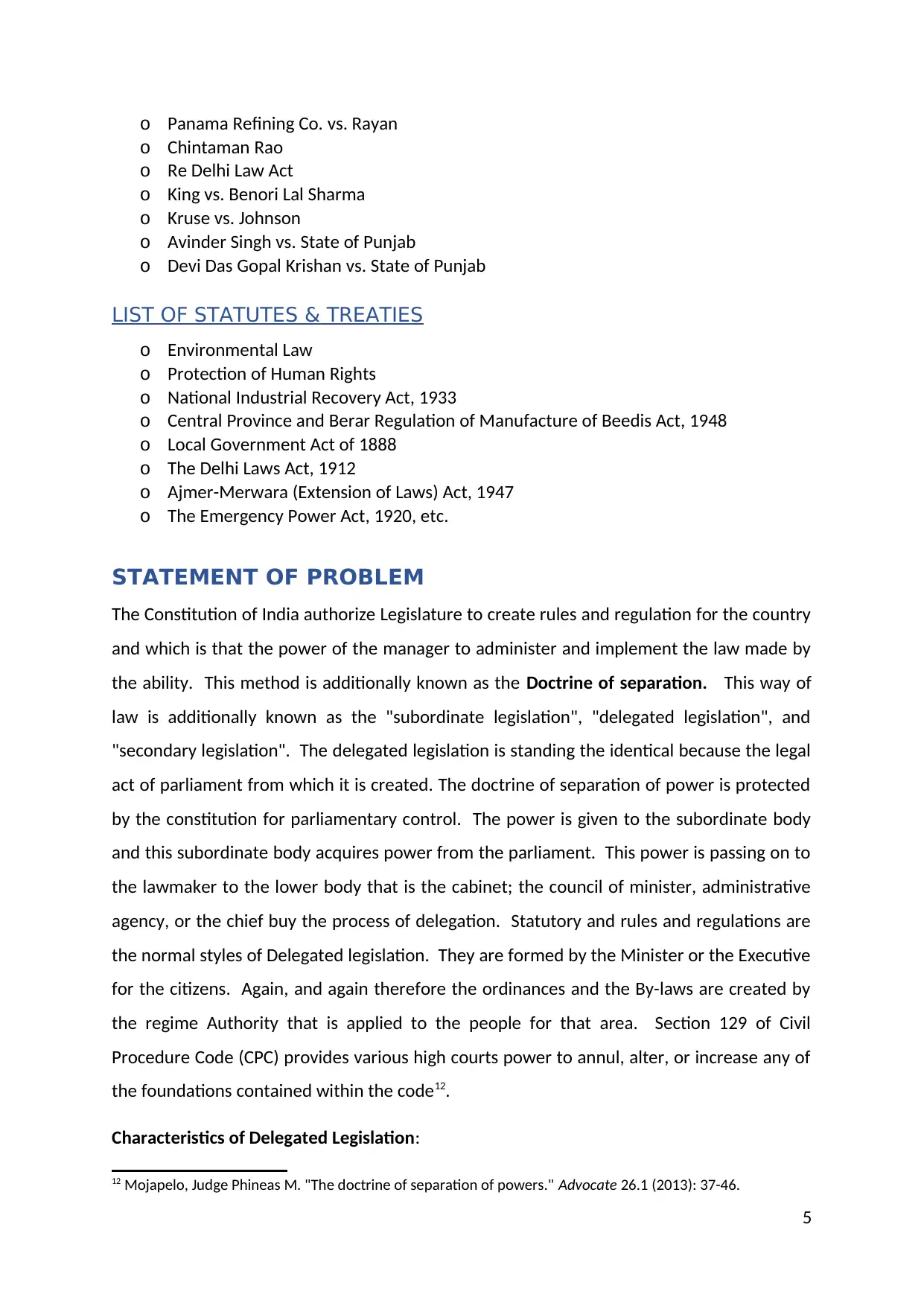
o Panama Refining Co. vs. Rayan
o Chintaman Rao
o Re Delhi Law Act
o King vs. Benori Lal Sharma
o Kruse vs. Johnson
o Avinder Singh vs. State of Punjab
o Devi Das Gopal Krishan vs. State of Punjab
LIST OF STATUTES & TREATIES
o Environmental Law
o Protection of Human Rights
o National Industrial Recovery Act, 1933
o Central Province and Berar Regulation of Manufacture of Beedis Act, 1948
o Local Government Act of 1888
o The Delhi Laws Act, 1912
o Ajmer-Merwara (Extension of Laws) Act, 1947
o The Emergency Power Act, 1920, etc.
STATEMENT OF PROBLEM
The Constitution of India authorize Legislature to create rules and regulation for the country
and which is that the power of the manager to administer and implement the law made by
the ability. This method is additionally known as the Doctrine of separation. This way of
law is additionally known as the "subordinate legislation", "delegated legislation", and
"secondary legislation". The delegated legislation is standing the identical because the legal
act of parliament from which it is created. The doctrine of separation of power is protected
by the constitution for parliamentary control. The power is given to the subordinate body
and this subordinate body acquires power from the parliament. This power is passing on to
the lawmaker to the lower body that is the cabinet; the council of minister, administrative
agency, or the chief buy the process of delegation. Statutory and rules and regulations are
the normal styles of Delegated legislation. They are formed by the Minister or the Executive
for the citizens. Again, and again therefore the ordinances and the By-laws are created by
the regime Authority that is applied to the people for that area. Section 129 of Civil
Procedure Code (CPC) provides various high courts power to annul, alter, or increase any of
the foundations contained within the code12.
Characteristics of Delegated Legislation:
12 Mojapelo, Judge Phineas M. "The doctrine of separation of powers." Advocate 26.1 (2013): 37-46.
5
o Chintaman Rao
o Re Delhi Law Act
o King vs. Benori Lal Sharma
o Kruse vs. Johnson
o Avinder Singh vs. State of Punjab
o Devi Das Gopal Krishan vs. State of Punjab
LIST OF STATUTES & TREATIES
o Environmental Law
o Protection of Human Rights
o National Industrial Recovery Act, 1933
o Central Province and Berar Regulation of Manufacture of Beedis Act, 1948
o Local Government Act of 1888
o The Delhi Laws Act, 1912
o Ajmer-Merwara (Extension of Laws) Act, 1947
o The Emergency Power Act, 1920, etc.
STATEMENT OF PROBLEM
The Constitution of India authorize Legislature to create rules and regulation for the country
and which is that the power of the manager to administer and implement the law made by
the ability. This method is additionally known as the Doctrine of separation. This way of
law is additionally known as the "subordinate legislation", "delegated legislation", and
"secondary legislation". The delegated legislation is standing the identical because the legal
act of parliament from which it is created. The doctrine of separation of power is protected
by the constitution for parliamentary control. The power is given to the subordinate body
and this subordinate body acquires power from the parliament. This power is passing on to
the lawmaker to the lower body that is the cabinet; the council of minister, administrative
agency, or the chief buy the process of delegation. Statutory and rules and regulations are
the normal styles of Delegated legislation. They are formed by the Minister or the Executive
for the citizens. Again, and again therefore the ordinances and the By-laws are created by
the regime Authority that is applied to the people for that area. Section 129 of Civil
Procedure Code (CPC) provides various high courts power to annul, alter, or increase any of
the foundations contained within the code12.
Characteristics of Delegated Legislation:
12 Mojapelo, Judge Phineas M. "The doctrine of separation of powers." Advocate 26.1 (2013): 37-46.
5
⊘ This is a preview!⊘
Do you want full access?
Subscribe today to unlock all pages.

Trusted by 1+ million students worldwide
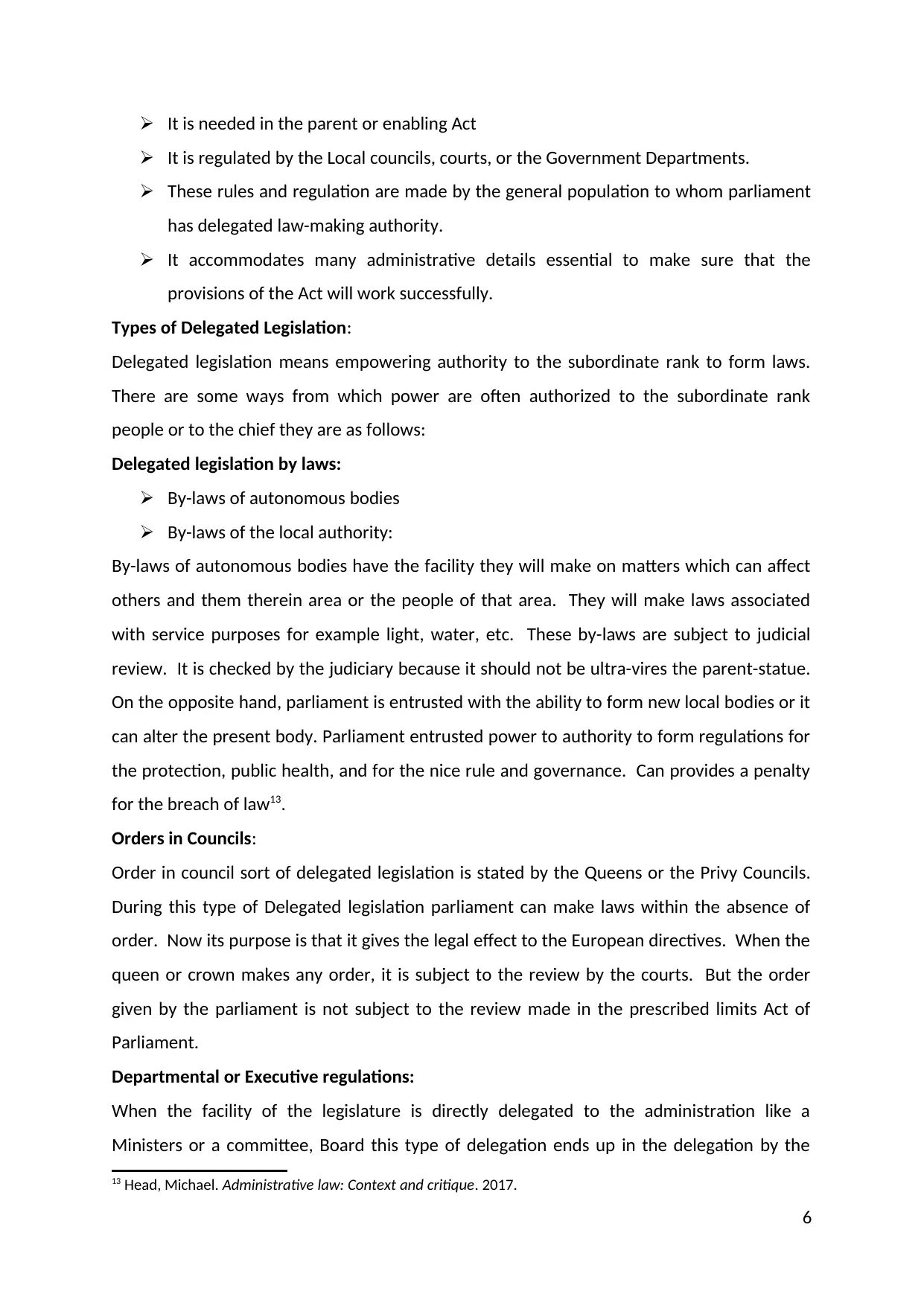
It is needed in the parent or enabling Act
It is regulated by the Local councils, courts, or the Government Departments.
These rules and regulation are made by the general population to whom parliament
has delegated law-making authority.
It accommodates many administrative details essential to make sure that the
provisions of the Act will work successfully.
Types of Delegated Legislation:
Delegated legislation means empowering authority to the subordinate rank to form laws.
There are some ways from which power are often authorized to the subordinate rank
people or to the chief they are as follows:
Delegated legislation by laws:
By-laws of autonomous bodies
By-laws of the local authority:
By-laws of autonomous bodies have the facility they will make on matters which can affect
others and them therein area or the people of that area. They will make laws associated
with service purposes for example light, water, etc. These by-laws are subject to judicial
review. It is checked by the judiciary because it should not be ultra-vires the parent-statue.
On the opposite hand, parliament is entrusted with the ability to form new local bodies or it
can alter the present body. Parliament entrusted power to authority to form regulations for
the protection, public health, and for the nice rule and governance. Can provides a penalty
for the breach of law13.
Orders in Councils:
Order in council sort of delegated legislation is stated by the Queens or the Privy Councils.
During this type of Delegated legislation parliament can make laws within the absence of
order. Now its purpose is that it gives the legal effect to the European directives. When the
queen or crown makes any order, it is subject to the review by the courts. But the order
given by the parliament is not subject to the review made in the prescribed limits Act of
Parliament.
Departmental or Executive regulations:
When the facility of the legislature is directly delegated to the administration like a
Ministers or a committee, Board this type of delegation ends up in the delegation by the
13 Head, Michael. Administrative law: Context and critique. 2017.
6
It is regulated by the Local councils, courts, or the Government Departments.
These rules and regulation are made by the general population to whom parliament
has delegated law-making authority.
It accommodates many administrative details essential to make sure that the
provisions of the Act will work successfully.
Types of Delegated Legislation:
Delegated legislation means empowering authority to the subordinate rank to form laws.
There are some ways from which power are often authorized to the subordinate rank
people or to the chief they are as follows:
Delegated legislation by laws:
By-laws of autonomous bodies
By-laws of the local authority:
By-laws of autonomous bodies have the facility they will make on matters which can affect
others and them therein area or the people of that area. They will make laws associated
with service purposes for example light, water, etc. These by-laws are subject to judicial
review. It is checked by the judiciary because it should not be ultra-vires the parent-statue.
On the opposite hand, parliament is entrusted with the ability to form new local bodies or it
can alter the present body. Parliament entrusted power to authority to form regulations for
the protection, public health, and for the nice rule and governance. Can provides a penalty
for the breach of law13.
Orders in Councils:
Order in council sort of delegated legislation is stated by the Queens or the Privy Councils.
During this type of Delegated legislation parliament can make laws within the absence of
order. Now its purpose is that it gives the legal effect to the European directives. When the
queen or crown makes any order, it is subject to the review by the courts. But the order
given by the parliament is not subject to the review made in the prescribed limits Act of
Parliament.
Departmental or Executive regulations:
When the facility of the legislature is directly delegated to the administration like a
Ministers or a committee, Board this type of delegation ends up in the delegation by the
13 Head, Michael. Administrative law: Context and critique. 2017.
6
Paraphrase This Document
Need a fresh take? Get an instant paraphrase of this document with our AI Paraphraser
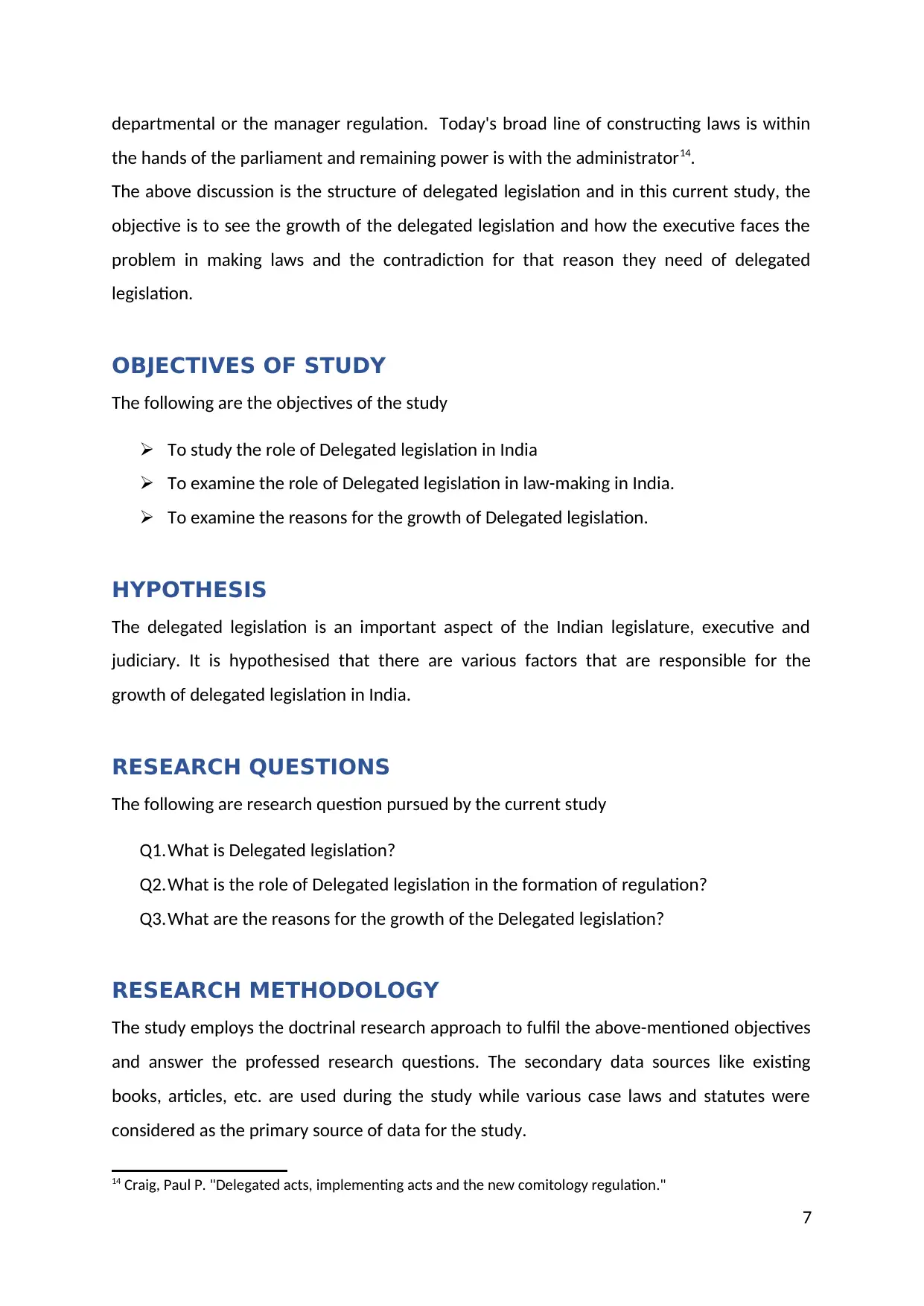
departmental or the manager regulation. Today's broad line of constructing laws is within
the hands of the parliament and remaining power is with the administrator14.
The above discussion is the structure of delegated legislation and in this current study, the
objective is to see the growth of the delegated legislation and how the executive faces the
problem in making laws and the contradiction for that reason they need of delegated
legislation.
OBJECTIVES OF STUDY
The following are the objectives of the study
To study the role of Delegated legislation in India
To examine the role of Delegated legislation in law-making in India.
To examine the reasons for the growth of Delegated legislation.
HYPOTHESIS
The delegated legislation is an important aspect of the Indian legislature, executive and
judiciary. It is hypothesised that there are various factors that are responsible for the
growth of delegated legislation in India.
RESEARCH QUESTIONS
The following are research question pursued by the current study
Q1.What is Delegated legislation?
Q2.What is the role of Delegated legislation in the formation of regulation?
Q3.What are the reasons for the growth of the Delegated legislation?
RESEARCH METHODOLOGY
The study employs the doctrinal research approach to fulfil the above-mentioned objectives
and answer the professed research questions. The secondary data sources like existing
books, articles, etc. are used during the study while various case laws and statutes were
considered as the primary source of data for the study.
14 Craig, Paul P. "Delegated acts, implementing acts and the new comitology regulation."
7
the hands of the parliament and remaining power is with the administrator14.
The above discussion is the structure of delegated legislation and in this current study, the
objective is to see the growth of the delegated legislation and how the executive faces the
problem in making laws and the contradiction for that reason they need of delegated
legislation.
OBJECTIVES OF STUDY
The following are the objectives of the study
To study the role of Delegated legislation in India
To examine the role of Delegated legislation in law-making in India.
To examine the reasons for the growth of Delegated legislation.
HYPOTHESIS
The delegated legislation is an important aspect of the Indian legislature, executive and
judiciary. It is hypothesised that there are various factors that are responsible for the
growth of delegated legislation in India.
RESEARCH QUESTIONS
The following are research question pursued by the current study
Q1.What is Delegated legislation?
Q2.What is the role of Delegated legislation in the formation of regulation?
Q3.What are the reasons for the growth of the Delegated legislation?
RESEARCH METHODOLOGY
The study employs the doctrinal research approach to fulfil the above-mentioned objectives
and answer the professed research questions. The secondary data sources like existing
books, articles, etc. are used during the study while various case laws and statutes were
considered as the primary source of data for the study.
14 Craig, Paul P. "Delegated acts, implementing acts and the new comitology regulation."
7

8
⊘ This is a preview!⊘
Do you want full access?
Subscribe today to unlock all pages.

Trusted by 1+ million students worldwide
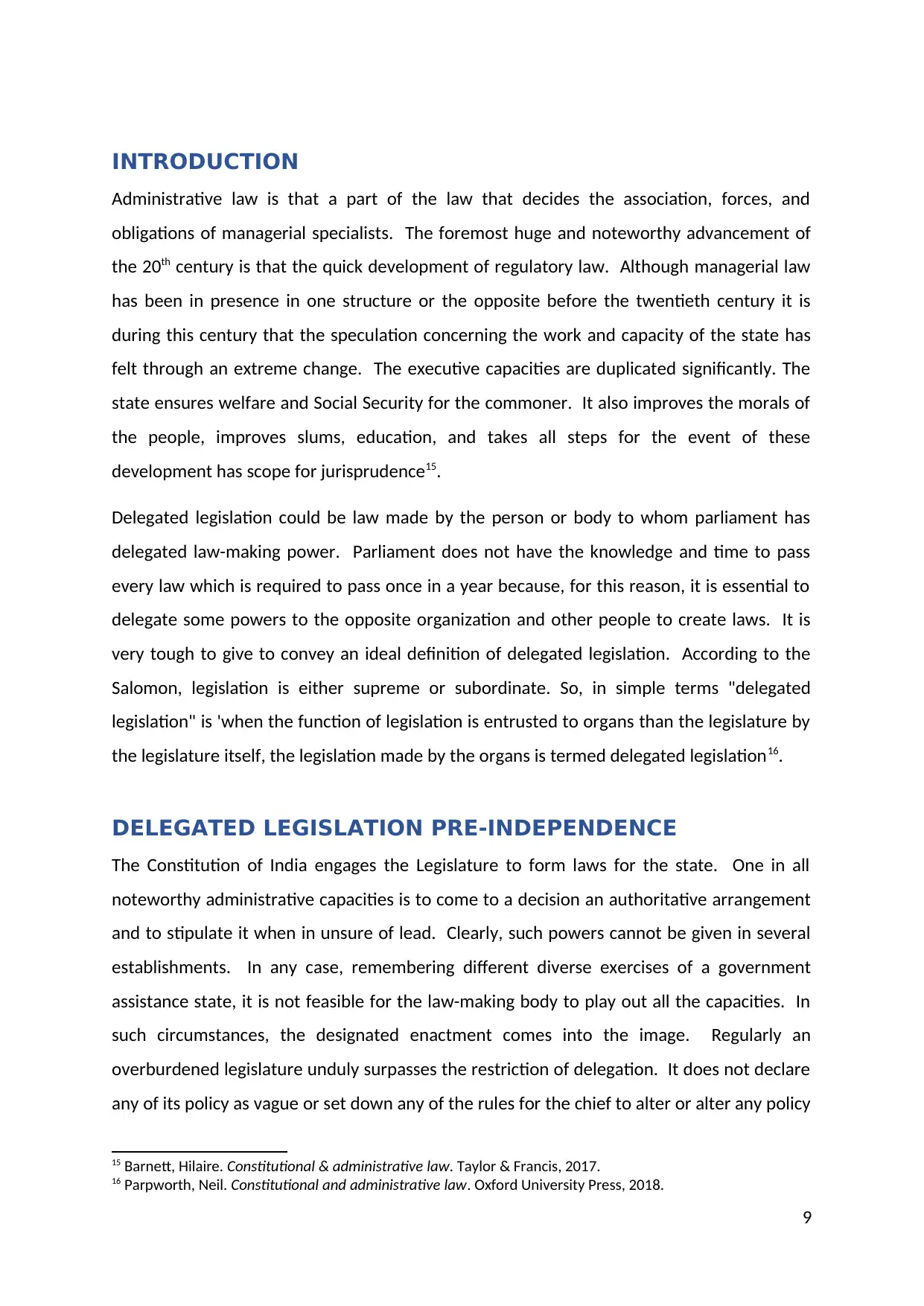
INTRODUCTION
Administrative law is that a part of the law that decides the association, forces, and
obligations of managerial specialists. The foremost huge and noteworthy advancement of
the 20th century is that the quick development of regulatory law. Although managerial law
has been in presence in one structure or the opposite before the twentieth century it is
during this century that the speculation concerning the work and capacity of the state has
felt through an extreme change. The executive capacities are duplicated significantly. The
state ensures welfare and Social Security for the commoner. It also improves the morals of
the people, improves slums, education, and takes all steps for the event of these
development has scope for jurisprudence15.
Delegated legislation could be law made by the person or body to whom parliament has
delegated law-making power. Parliament does not have the knowledge and time to pass
every law which is required to pass once in a year because, for this reason, it is essential to
delegate some powers to the opposite organization and other people to create laws. It is
very tough to give to convey an ideal definition of delegated legislation. According to the
Salomon, legislation is either supreme or subordinate. So, in simple terms "delegated
legislation" is 'when the function of legislation is entrusted to organs than the legislature by
the legislature itself, the legislation made by the organs is termed delegated legislation16.
DELEGATED LEGISLATION PRE-INDEPENDENCE
The Constitution of India engages the Legislature to form laws for the state. One in all
noteworthy administrative capacities is to come to a decision an authoritative arrangement
and to stipulate it when in unsure of lead. Clearly, such powers cannot be given in several
establishments. In any case, remembering different diverse exercises of a government
assistance state, it is not feasible for the law-making body to play out all the capacities. In
such circumstances, the designated enactment comes into the image. Regularly an
overburdened legislature unduly surpasses the restriction of delegation. It does not declare
any of its policy as vague or set down any of the rules for the chief to alter or alter any policy
15 Barnett, Hilaire. Constitutional & administrative law. Taylor & Francis, 2017.
16 Parpworth, Neil. Constitutional and administrative law. Oxford University Press, 2018.
9
Administrative law is that a part of the law that decides the association, forces, and
obligations of managerial specialists. The foremost huge and noteworthy advancement of
the 20th century is that the quick development of regulatory law. Although managerial law
has been in presence in one structure or the opposite before the twentieth century it is
during this century that the speculation concerning the work and capacity of the state has
felt through an extreme change. The executive capacities are duplicated significantly. The
state ensures welfare and Social Security for the commoner. It also improves the morals of
the people, improves slums, education, and takes all steps for the event of these
development has scope for jurisprudence15.
Delegated legislation could be law made by the person or body to whom parliament has
delegated law-making power. Parliament does not have the knowledge and time to pass
every law which is required to pass once in a year because, for this reason, it is essential to
delegate some powers to the opposite organization and other people to create laws. It is
very tough to give to convey an ideal definition of delegated legislation. According to the
Salomon, legislation is either supreme or subordinate. So, in simple terms "delegated
legislation" is 'when the function of legislation is entrusted to organs than the legislature by
the legislature itself, the legislation made by the organs is termed delegated legislation16.
DELEGATED LEGISLATION PRE-INDEPENDENCE
The Constitution of India engages the Legislature to form laws for the state. One in all
noteworthy administrative capacities is to come to a decision an authoritative arrangement
and to stipulate it when in unsure of lead. Clearly, such powers cannot be given in several
establishments. In any case, remembering different diverse exercises of a government
assistance state, it is not feasible for the law-making body to play out all the capacities. In
such circumstances, the designated enactment comes into the image. Regularly an
overburdened legislature unduly surpasses the restriction of delegation. It does not declare
any of its policy as vague or set down any of the rules for the chief to alter or alter any policy
15 Barnett, Hilaire. Constitutional & administrative law. Taylor & Francis, 2017.
16 Parpworth, Neil. Constitutional and administrative law. Oxford University Press, 2018.
9
Paraphrase This Document
Need a fresh take? Get an instant paraphrase of this document with our AI Paraphraser
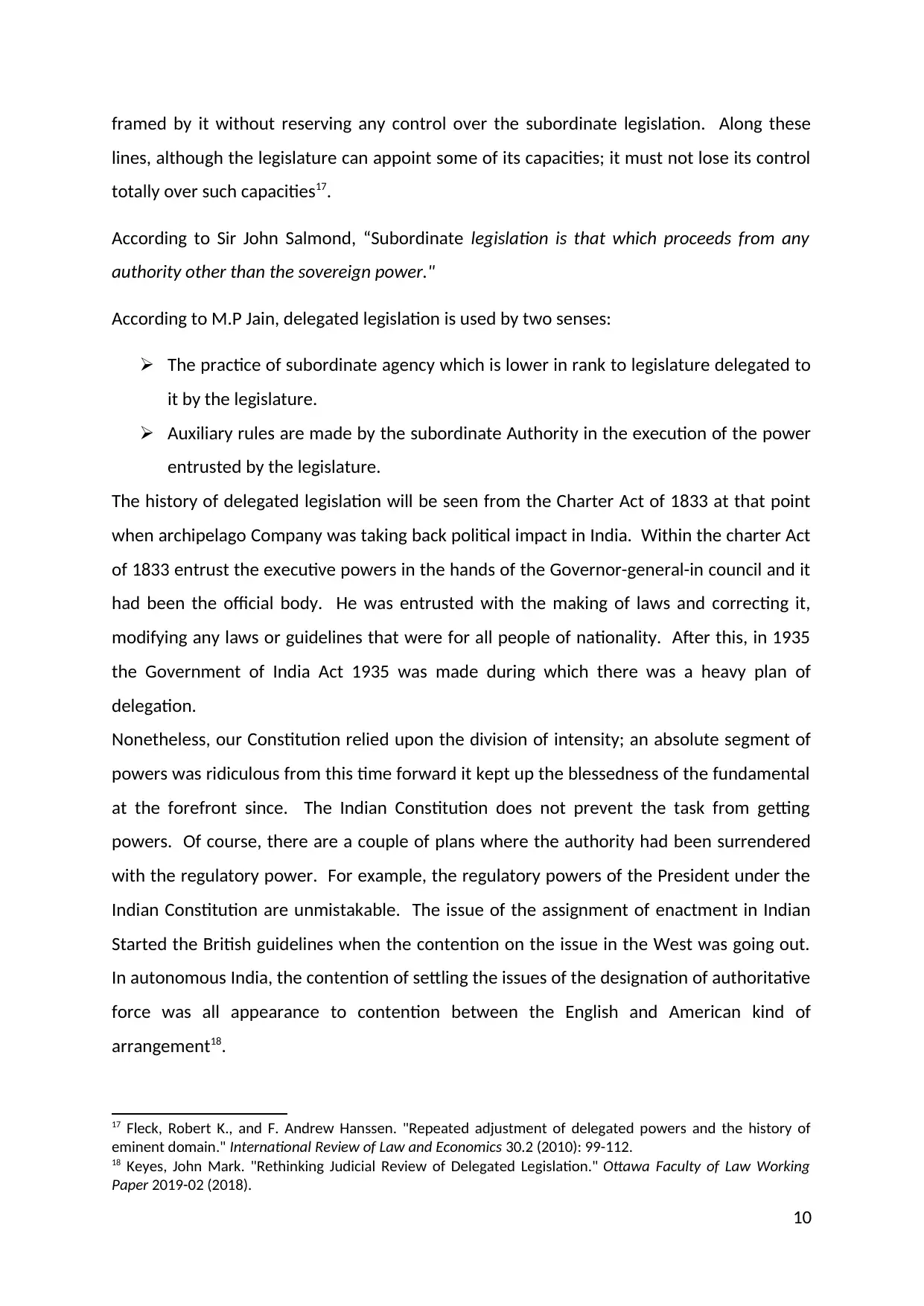
framed by it without reserving any control over the subordinate legislation. Along these
lines, although the legislature can appoint some of its capacities; it must not lose its control
totally over such capacities17.
According to Sir John Salmond, “Subordinate legislation is that which proceeds from any
authority other than the sovereign power."
According to M.P Jain, delegated legislation is used by two senses:
The practice of subordinate agency which is lower in rank to legislature delegated to
it by the legislature.
Auxiliary rules are made by the subordinate Authority in the execution of the power
entrusted by the legislature.
The history of delegated legislation will be seen from the Charter Act of 1833 at that point
when archipelago Company was taking back political impact in India. Within the charter Act
of 1833 entrust the executive powers in the hands of the Governor-general-in council and it
had been the official body. He was entrusted with the making of laws and correcting it,
modifying any laws or guidelines that were for all people of nationality. After this, in 1935
the Government of India Act 1935 was made during which there was a heavy plan of
delegation.
Nonetheless, our Constitution relied upon the division of intensity; an absolute segment of
powers was ridiculous from this time forward it kept up the blessedness of the fundamental
at the forefront since. The Indian Constitution does not prevent the task from getting
powers. Of course, there are a couple of plans where the authority had been surrendered
with the regulatory power. For example, the regulatory powers of the President under the
Indian Constitution are unmistakable. The issue of the assignment of enactment in Indian
Started the British guidelines when the contention on the issue in the West was going out.
In autonomous India, the contention of settling the issues of the designation of authoritative
force was all appearance to contention between the English and American kind of
arrangement18.
17 Fleck, Robert K., and F. Andrew Hanssen. "Repeated adjustment of delegated powers and the history of
eminent domain." International Review of Law and Economics 30.2 (2010): 99-112.
18 Keyes, John Mark. "Rethinking Judicial Review of Delegated Legislation." Ottawa Faculty of Law Working
Paper 2019-02 (2018).
10
lines, although the legislature can appoint some of its capacities; it must not lose its control
totally over such capacities17.
According to Sir John Salmond, “Subordinate legislation is that which proceeds from any
authority other than the sovereign power."
According to M.P Jain, delegated legislation is used by two senses:
The practice of subordinate agency which is lower in rank to legislature delegated to
it by the legislature.
Auxiliary rules are made by the subordinate Authority in the execution of the power
entrusted by the legislature.
The history of delegated legislation will be seen from the Charter Act of 1833 at that point
when archipelago Company was taking back political impact in India. Within the charter Act
of 1833 entrust the executive powers in the hands of the Governor-general-in council and it
had been the official body. He was entrusted with the making of laws and correcting it,
modifying any laws or guidelines that were for all people of nationality. After this, in 1935
the Government of India Act 1935 was made during which there was a heavy plan of
delegation.
Nonetheless, our Constitution relied upon the division of intensity; an absolute segment of
powers was ridiculous from this time forward it kept up the blessedness of the fundamental
at the forefront since. The Indian Constitution does not prevent the task from getting
powers. Of course, there are a couple of plans where the authority had been surrendered
with the regulatory power. For example, the regulatory powers of the President under the
Indian Constitution are unmistakable. The issue of the assignment of enactment in Indian
Started the British guidelines when the contention on the issue in the West was going out.
In autonomous India, the contention of settling the issues of the designation of authoritative
force was all appearance to contention between the English and American kind of
arrangement18.
17 Fleck, Robert K., and F. Andrew Hanssen. "Repeated adjustment of delegated powers and the history of
eminent domain." International Review of Law and Economics 30.2 (2010): 99-112.
18 Keyes, John Mark. "Rethinking Judicial Review of Delegated Legislation." Ottawa Faculty of Law Working
Paper 2019-02 (2018).
10
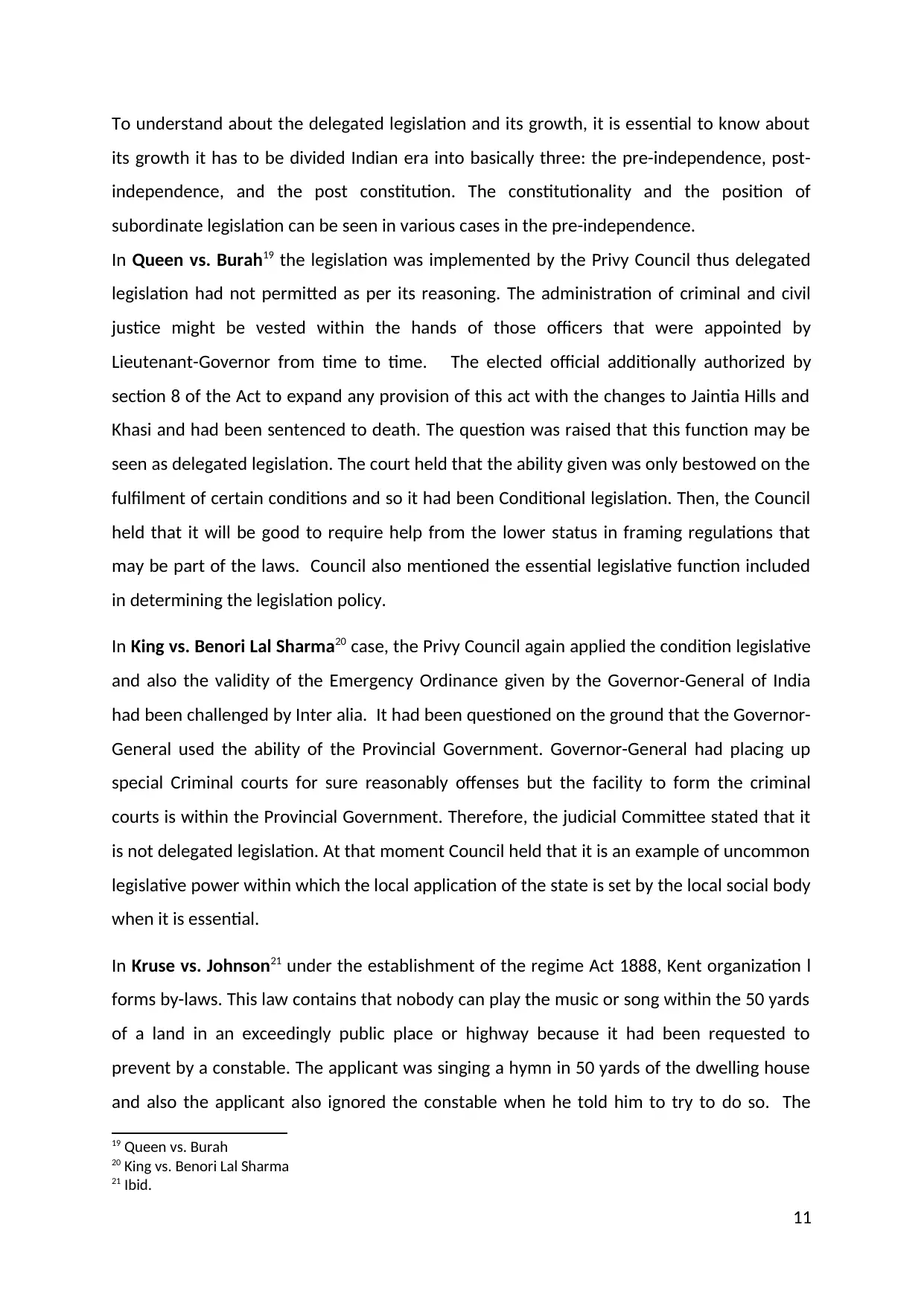
To understand about the delegated legislation and its growth, it is essential to know about
its growth it has to be divided Indian era into basically three: the pre-independence, post-
independence, and the post constitution. The constitutionality and the position of
subordinate legislation can be seen in various cases in the pre-independence.
In Queen vs. Burah19 the legislation was implemented by the Privy Council thus delegated
legislation had not permitted as per its reasoning. The administration of criminal and civil
justice might be vested within the hands of those officers that were appointed by
Lieutenant-Governor from time to time. The elected official additionally authorized by
section 8 of the Act to expand any provision of this act with the changes to Jaintia Hills and
Khasi and had been sentenced to death. The question was raised that this function may be
seen as delegated legislation. The court held that the ability given was only bestowed on the
fulfilment of certain conditions and so it had been Conditional legislation. Then, the Council
held that it will be good to require help from the lower status in framing regulations that
may be part of the laws. Council also mentioned the essential legislative function included
in determining the legislation policy.
In King vs. Benori Lal Sharma20 case, the Privy Council again applied the condition legislative
and also the validity of the Emergency Ordinance given by the Governor-General of India
had been challenged by Inter alia. It had been questioned on the ground that the Governor-
General used the ability of the Provincial Government. Governor-General had placing up
special Criminal courts for sure reasonably offenses but the facility to form the criminal
courts is within the Provincial Government. Therefore, the judicial Committee stated that it
is not delegated legislation. At that moment Council held that it is an example of uncommon
legislative power within which the local application of the state is set by the local social body
when it is essential.
In Kruse vs. Johnson21 under the establishment of the regime Act 1888, Kent organization l
forms by-laws. This law contains that nobody can play the music or song within the 50 yards
of a land in an exceedingly public place or highway because it had been requested to
prevent by a constable. The applicant was singing a hymn in 50 yards of the dwelling house
and also the applicant also ignored the constable when he told him to try to do so. The
19 Queen vs. Burah
20 King vs. Benori Lal Sharma
21 Ibid.
11
its growth it has to be divided Indian era into basically three: the pre-independence, post-
independence, and the post constitution. The constitutionality and the position of
subordinate legislation can be seen in various cases in the pre-independence.
In Queen vs. Burah19 the legislation was implemented by the Privy Council thus delegated
legislation had not permitted as per its reasoning. The administration of criminal and civil
justice might be vested within the hands of those officers that were appointed by
Lieutenant-Governor from time to time. The elected official additionally authorized by
section 8 of the Act to expand any provision of this act with the changes to Jaintia Hills and
Khasi and had been sentenced to death. The question was raised that this function may be
seen as delegated legislation. The court held that the ability given was only bestowed on the
fulfilment of certain conditions and so it had been Conditional legislation. Then, the Council
held that it will be good to require help from the lower status in framing regulations that
may be part of the laws. Council also mentioned the essential legislative function included
in determining the legislation policy.
In King vs. Benori Lal Sharma20 case, the Privy Council again applied the condition legislative
and also the validity of the Emergency Ordinance given by the Governor-General of India
had been challenged by Inter alia. It had been questioned on the ground that the Governor-
General used the ability of the Provincial Government. Governor-General had placing up
special Criminal courts for sure reasonably offenses but the facility to form the criminal
courts is within the Provincial Government. Therefore, the judicial Committee stated that it
is not delegated legislation. At that moment Council held that it is an example of uncommon
legislative power within which the local application of the state is set by the local social body
when it is essential.
In Kruse vs. Johnson21 under the establishment of the regime Act 1888, Kent organization l
forms by-laws. This law contains that nobody can play the music or song within the 50 yards
of a land in an exceedingly public place or highway because it had been requested to
prevent by a constable. The applicant was singing a hymn in 50 yards of the dwelling house
and also the applicant also ignored the constable when he told him to try to do so. The
19 Queen vs. Burah
20 King vs. Benori Lal Sharma
21 Ibid.
11
⊘ This is a preview!⊘
Do you want full access?
Subscribe today to unlock all pages.

Trusted by 1+ million students worldwide
1 out of 19
Related Documents
Your All-in-One AI-Powered Toolkit for Academic Success.
+13062052269
info@desklib.com
Available 24*7 on WhatsApp / Email
![[object Object]](/_next/static/media/star-bottom.7253800d.svg)
Unlock your academic potential
Copyright © 2020–2025 A2Z Services. All Rights Reserved. Developed and managed by ZUCOL.





